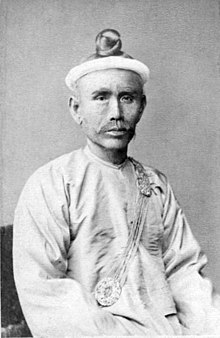History
Kinwun Mingyi U Kaung
- Details
- Hits: 4541
 Kinwun Mingyi U Kaung
Kinwun Mingyi U Kaung
U Kaung at age 50
Photo Credit - www.wikipedia.org
Kinwun Mingyi U Kaung C.S.I. (Burmese: ကင်းဝန်မင်းကြီး ဦးကောင်း, likewise spelt U Gaung; 3 February 1822 – 30 June 1908) was a central priest amid the rules of King Mindon and Thibaw, and also a pioneer government employee. He endeavored to westernize the Burmese kingdom's current organization into a more law based framework. In view of such endeavors to do as such, he was charged by many to have enabled Britain to win the Third Anglo-Burmese War.
Kinwon Mingyi was born Maung Chin (မောင်ချင်း) on 3 February 1822 (Sunday, twelfth waxing of Tabodwe 1183 ME) in Madaingbin town (in the Lower Chindwin area). His dad U Hmo was a trooper in the Natshinywe Infantry Regiment. As was standard convention, he was bound to take after the strides of his dad. In any case, he got away induction by appointing as a Buddhist minister and was given the Dharma name Āloka (အာလောက). He moved to Amarapura and inhabited Bagaya Monastery, the religious community of the Bagaya Sayadaw, then the Supreme Patriarch of the Konbaung administration. He was likewise educated at a school driven by U Yanwe, who in the long run turned into the central clergyman of King Mindon with the title Pakan Mingyi. He stripped and come back to the common people at 25 years old.
After the Second Anglo-Burmese War in 1853, he joined the court administration of King Mindon (who had dismissed his stepbrother, King Tharrawaddy), who renamed him U Kaung (ဦးကောင်း, lit. "great", considered more ideal than his original name Chin) and selected him the Clerk of the Royal Treasury (ရွှေတိုက်စာရေး). In 1871, he was selected priest of third rank (ဝန်ထောက်) at the Hluttaw, the national administering body and was in charge of the nation's police and traditions stations, where he earned his moniker Kinwun (lit. 'priest of the watch stations').
In 1871, he drove the primary Burmese strategic gathering to Europe and effectively attested Burmese sway. In planning for the trek, he rose to the rank of Wungyi, the central clergyman. There, he was gotten by Queen Victoria and contributed Prince of Wales (later to be King Edward VII) and William Ewart Gladstone gold salwe of 21 and 18 strings separately. he and his international safe haven, comprising of Shwe O (later the Kyaukmyaung Atwinwun) and Shwe Bin and Maung Mye (later the Debayin Wundauk). By 1872, he had ascended to the rank of local legislative leader of Minhla District.
Before King Mindon's passing in 1878, U Kaung was made Commander-in-Chief. Subsequent to King Mindon's demise, Kinwun Mingyi lost a lot of his impact. He requested the Burmese troops amid the Third Anglo-Burmese War to not assault attacking British. U Kaung's part in the underlying breakdown of Burmese resistance later offered ascend to the prevalent mental aide U Kaung lein htouk, minzet pyouk ("U Kaung's unfairness, end of tradition", ဦးကောင်းလိမ်ထုတ် မင်းဆက်ပြုတ်), comparing to Burmese Era 1247 or 1885 AD in Burmese numerology.
Under British pioneer govern, Kinwon Mingyi filled in as a government worker in the British organization. In 1888, he was granted the Companions of the Order of the Star of India (CSI) and in 1897, he ended up noticeably one of the initial two indigenous Burmese to be named to the Legislative Council of Burma.
Amid his common administration, he penned numerous popular books and lyrics in Burmese writing. Among them were the Attathamkhepa Wunnana Dhammathat (အဋသံခေပဝဏ္ဏနာဓမ္မသတ်) and the Digest of Buddhist Law. His own library was obtained by the Bernard Free Library in Rangoon.
U Kaung was twice hitched. His first marriage was to the Princess of Singyan, one of the lesser rulers of Pagan Min. His second was to Shwe May, the little girl of the myothugyi (genetic boss) of Ahlone, a town in Monywa Township. He didn't have any natural kids, however he received two children of the his brother by marriage (of his second spouse).
He died of paralysis at his home in Fort Dufferin in Mandalay on 30 June 1908.






